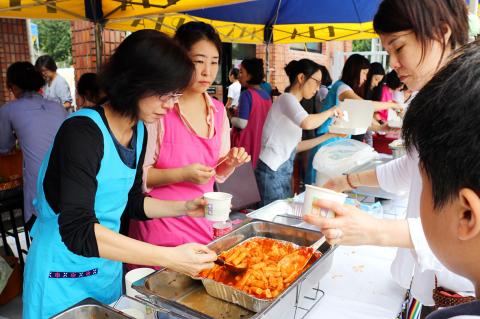If there’s one thing that the doting parents of Taipei American School (TAS) care fervently about (besides their children’s SAT scores), it’s nourishing young minds. The international food fair organized by the Parent Teacher Association (PTA) is an event that draws thousands of foodies from the expat community of suburban Tianmu and beyond every year. The fair returns tomorrow for its 33rd year.
From Vietnam to Venezuela, more than 20 countries are represented and around 8,000 visitors are expected to show up. In addition to sushi, samosas and shaved ice — all prepared by the gracious parents — there will also be arts and crafts stations, a bouncy castle, as well as a haunted house full of goblins and ghosts orchestrated entirely by the high school students.
Speaking on behalf of the PTA, Priya Purswaney says: “The parents put in a lot of hard work months before the event to ensure that it goes smoothly.”

Photo courtesy of TAS
Purswaney adds that in recent years, the fair has drawn more volunteers from outside of the TAS community, and that local schools in Taipei even arrange field trips to visit the fair. More student associations and clubs at TAS have also been involved in planning the activities for this year’s fair, so expect to see new booths in addition to the usual face painting, water balloon toss and stands selling fake tattoos.
“The fair has become more international and features double the number of clubs, so that means double the fun,” Purswaney says.
Though it’s expected that when you bring a bunch of parents together, there’s bound to be some squabbles.

Photo courtesy of TAS
Nevertheless, the PTA says the preparation is mostly a concerted effort, and that what’s more important is that the parents have the students’ well-being at heart.
“The only thing the TAS parents get out of it is the satisfaction of doing something for the school,” Purswaney says.
If there’s one thing they can agree upon though, it’s promoting healthy eating (never mind the cotton candy stand that seems to have the longest line every year). The school’s cafeteria does indeed have an amazing assortment of gourmet dishes that would put many seasoned restaurateurs to shame. As for the fair, the food is mostly home-cooked or sponsored by top restaurants around Taipei.
“It’s definitely important to teach children at an early age the importance of a healthy diet.” Purswaney says. “The TAS cafeteria is a no fry zone, and vendors at the fair are also encouraged to reduce the amount of fried goods.”
The food fair starts tomorrow at 10am and is open to the public. A portion of the proceeds will go to developing the school, while the rest of the funds is allocated to different charities each year.

That US assistance was a model for Taiwan’s spectacular development success was early recognized by policymakers and analysts. In a report to the US Congress for the fiscal year 1962, former President John F. Kennedy noted Taiwan’s “rapid economic growth,” was “producing a substantial net gain in living.” Kennedy had a stake in Taiwan’s achievements and the US’ official development assistance (ODA) in general: In September 1961, his entreaty to make the 1960s a “decade of development,” and an accompanying proposal for dedicated legislation to this end, had been formalized by congressional passage of the Foreign Assistance Act. Two

March 31 to April 6 On May 13, 1950, National Taiwan University Hospital otolaryngologist Su You-peng (蘇友鵬) was summoned to the director’s office. He thought someone had complained about him practicing the violin at night, but when he entered the room, he knew something was terribly wrong. He saw several burly men who appeared to be government secret agents, and three other resident doctors: internist Hsu Chiang (許強), dermatologist Hu Pao-chen (胡寶珍) and ophthalmologist Hu Hsin-lin (胡鑫麟). They were handcuffed, herded onto two jeeps and taken to the Secrecy Bureau (保密局) for questioning. Su was still in his doctor’s robes at

Last week the Democratic Progressive Party (DPP) said that the budget cuts voted for by the China-aligned parties in the legislature, are intended to force the DPP to hike electricity rates. The public would then blame it for the rate hike. It’s fairly clear that the first part of that is correct. Slashing the budget of state-run Taiwan Power Co (Taipower, 台電) is a move intended to cause discontent with the DPP when electricity rates go up. Taipower’s debt, NT$422.9 billion (US$12.78 billion), is one of the numerous permanent crises created by the nation’s construction-industrial state and the developmentalist mentality it

Experts say that the devastating earthquake in Myanmar on Friday was likely the strongest to hit the country in decades, with disaster modeling suggesting thousands could be dead. Automatic assessments from the US Geological Survey (USGS) said the shallow 7.7-magnitude quake northwest of the central Myanmar city of Sagaing triggered a red alert for shaking-related fatalities and economic losses. “High casualties and extensive damage are probable and the disaster is likely widespread,” it said, locating the epicentre near the central Myanmar city of Mandalay, home to more than a million people. Myanmar’s ruling junta said on Saturday morning that the number killed had